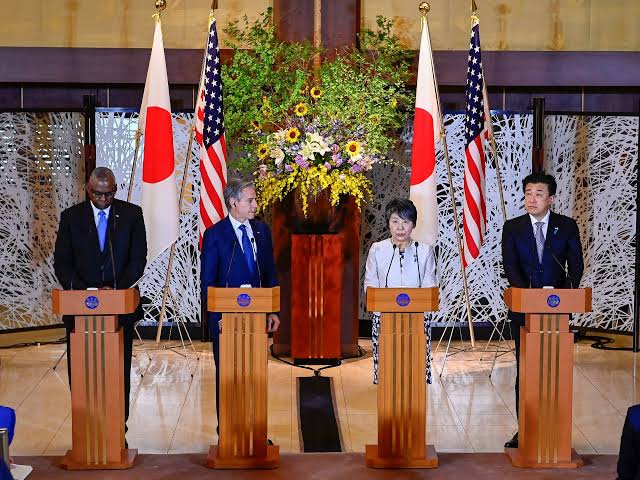The US is changing its military command in Japan because it is becoming more worried about China’s threats.
The US has announced plans to change its military command structure in Japan. This is a big change for defense ties between the US and Japan. As worries about China’s assertive actions in the region grow, this upgrade is meant to make military cooperation between the two countries stronger. The news came from U.S. Secretary of Defense Lloyd Austin during the “2+2” talks in Tokyo, which were a meeting of the defense and foreign ministers from both countries.
In a statement that emphasized the strategic importance of the plan, Secretary Austin said, “The United States will upgrade the US Forces Japan to a joint force headquarters with expanded missions and operational responsibilities.” This restructuring is the biggest improvement to the U.S.-Japan relationship in the past few years, and it shows how closely the two countries are working together militarily.

New U.S. joint force headquarters in Japan aims to bolster regional security and counter China’s growing influence.
The planned upgrade will turn the US Forces Japan (USFJ) into the center of a joint force. This new structure is meant to make it easier for the different parts of the U.S. military to work together, which will make operations in the area more coordinated and effective. The joint force center will be in charge of more tasks, such as protecting against missiles, keeping the seas safe, and fighting Chinese threats.
It’s interesting that this announcement came at a time when tensions are rising in the Asia-Pacific area. People in the region and around the world are worried about China’s growing military actions, such as its strong stance on territorial disputes in the South China Sea and its frequent military drills near Taiwan. These actions are seen as unstable by the US and Japan, so they have tried to strengthen their defenses in reaction.
It will also be easier to work together with Japan’s Self-Defense Forces (JSDF) now that the command system has been improved. This move is in line with Japan’s recent changes to its defense policy, such as spending more on defense and buying more powerful military gear. In line with the U.S. plan to fight regional threats, Japan has been improving its skills in areas like missile defense and maritime security.
The increased U.S. military force in Japan is also meant to make China aware of how strong and stable the alliance between the U.S. and Japan is. Both countries have talked about how important it is for the Indo-Pacific to be free and open. This idea shows how important it is for the world to have a rules-based order and respect for territory. The stronger leadership in Japan will be very important for keeping the area safe and preventing any possible aggression.
The U.S. upgrades military command in Japan, enhancing defense cooperation amid rising China tensions.
The “2+2” talks also brought up other ways that the two countries could work together, such as cyber defense, space security, and joint military drills. Talks like these show that people are thinking about all the problems that China’s rise and its effects on regional security can cause.
For these reasons, the U.S. move to improve its military command in Japan is a major step toward making both countries safer. As China’s military grows, the stronger alliance between the US and Japan wants to keep the peace and stability in the region. This move not only strengthens their promise to defend each other, but it also acts as a strategic check on China’s growing power in the Asia-Pacific area. The new command system shows how strong the relationship between the US and Japan is as they work together to deal with new security problems.